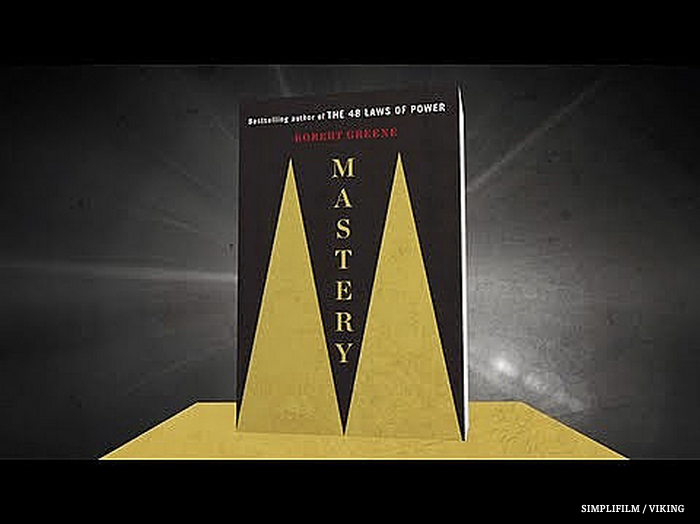The Key Message
At the heart of „Mastery“ lies the concept of the Life’s Task. Greene argues that within each of us is a hidden force, an innate drive that guides us toward our true calling. This force, often buried under societal expectations and distractions, must be rediscovered and nurtured. To embark on this journey, we must reconnect with our primal inclinations and pursue what we genuinely love.
How to discover your Life`s Task
-
Return to Your Origins: Reflect on what you loved as a child, as these primal inclinations often reveal your true interests and passions.
-
Occupy the Perfect Niche: Seek a niche where your interests align, whether by exploring side paths or by creatively combining skills from different fields to establish a new niche.
-
Avoid the False Path: Stay vigilant against being swayed by others‘ desires or societal expectations. If you find yourself on a path that isn’t true to you, recognize it quickly and take steps to rebel against it.
-
Adapt and Evolve: In a rapidly changing world, your life’s task must also evolve. Be flexible, adapt to new circumstances, and maintain a future-focused mindset.
-
Sacrifice for Your Path: Achieving true fulfillment requires sacrifices. Be prepared to give up short-term comforts for the sake of long-term mastery and success in your chosen path.
The Ideal Apprenticeship
The apprenticeship phase is a crucial period in one’s life, especially when choosing a career path. This transformative period is focused on personal growth and skill acquisition rather than immediate rewards. The goal is to master your field, which in turn prepares you for future success.
In this phase, prioritize learning over financial gain by seeking opportunities that offer the most educational value. The journey consists of three key steps: Deep Observation, Skill Acquisition, and Experimentation.
Step 1: Deep Observation involves thoroughly understanding the workplace environment by observing its dynamics, conventions, behaviors, and power structures. During the initial months, concentrate on absorbing knowledge rather than seeking recognition.
Step 2: Skill Acquisition requires breaking down skills into their core elements and practicing them diligently. Emphasize practical learning and avoid multitasking. Embrace challenges, move beyond boredom, and enjoy the process of mastering new skills.
Step 3: Experimentation encourages gaining confidence through active experimentation and seeking feedback. Initiate projects to test your skills, identify gaps, and overcome anxiety through trial and error.
Overall, the future belongs to those who creatively combine multiple skills. Use the internet as a tool for learning rather than mere consumption. Key strategies for completing the ideal apprenticeship include valuing learning experiences over monetary rewards, continuously expanding your knowledge, and entering new environments with an open mind. Trust the process, understand that frustration is part of the journey to mastery, seek resistance and pain to critically assess your work, and learn from failures as opportunities to improve. Use your twenties to explore and learn as many relevant skills as possible, understanding both the processes and outcomes in your field through trial and error.
Absorb the Masters Power: The Mentor Dynamic
The right mentors know where to focus your attention to. Their knowledge will become yours. Without any guidance you can waste valuable years.
How to Find the Right Mentor
To secure a mentor, especially someone experienced, you need to appeal to their self-interest. Offer something valuable that they need, something unique that others cannot provide. Understand their perspective and ask yourself, „What is their greatest need?“
Before seeking a mentor, focus on self-improvement. Cultivate basic skills like discipline and organization; the right mentor will recognize your potential.
The best mentors often have broad knowledge, helping you think critically and make connections across various fields. If you can’t find a mentor right away, books can serve as your mentors. Analyze them thoroughly and let their wisdom enhance your life. You can also use books to complement the guidance from a personal mentor.
While having one mentor is generally preferable, it’s possible to have multiple mentors specializing in different areas.
How to Use the Tool of the Mentor
Maximize in-person interactions with your mentor, as virtual relationships are insufficient. As your relationship with the mentor deepens, ask more specific questions. Eventually, you should aim for independence, striving to surpass your mentor in skill and knowledge.
It’s likely you’ll have multiple mentors throughout your life, each suited to different stages of your journey. It’s essential to find the right mentor for each phase, using them as stepping stones to greater mastery. Remember, the ultimate goal is to grow beyond your mentor’s teachings, as Nietzsche said, „One repays a teacher badly if one remains a pupil.“
Conclusion
Mastery is one of my personal favourites when it comes to non-fiction books. Therefore I would highly suggest reading it. While I tried to summarize the whole book, I noticed, that it contains way too much content. Now it`s up to you to read the book yoursefl and to soak up all the remaining knowledge.

